Stray Cat Rock: Machine Animal Blu-ray Movie
HomeStray Cat Rock: Machine Animal Blu-ray Movie 
Arrow | 1970 | 82 min | Not rated | No Release Date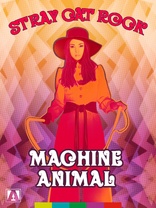
Price
Movie rating
6.4 | / 10 |
Blu-ray rating
| Users | 0.0 | |
| Reviewer | 2.5 | |
| Overall | 2.5 |
Overview
Stray Cat Rock: Machine Animal (1970)
Two Japanese men help a Vietnam war deserter escape from Japan for Sweden. They plan to fund the escape by selling LSD pills. After word of the drug deal gets spread around they find themselves fending off rival gangs.
Starring: Tatsuya Fuji, Meiko Kaji, Eiji Gô, Eiko Matsuda, Hajime SugiyamaDirector: Yasuharu Hasebe
| Foreign | Uncertain |
| Drama | Uncertain |
| Crime | Uncertain |
Specifications
Video
Video codec: MPEG-4 AVC
Video resolution: 1080p
Aspect ratio: 2.50:1
Original aspect ratio: 2.39:1
Audio
Japanese: LPCM Mono
Subtitles
English SDH
Discs
Blu-ray Disc
Single disc (1 BD)
Playback
Region A (B, C untested)
Review
Rating summary
| Movie | 2.5 | |
| Video | 3.5 | |
| Audio | 4.0 | |
| Extras | 2.0 | |
| Overall | 2.5 |
Stray Cat Rock: Machine Animal Blu-ray Movie Review
Reviewed by Jeffrey Kauffman October 27, 2020 Note: This film is available as part of
Stray Cat Rock: The Collection.
If you're a fan of "happened on this day" trivia, here's a little example, though I'm just a few days late as this review is going live. There was a
(very) little remembered musical that opened almost exactly 53 years ago to the day on October 23, 1967, called Henry, Sweet
Henry, which was based on the charming Peter Sellers film The World of Henry Orient. Though it only ran for 80 official performances, it was ironically one of the more successful
musicals in a disastrous year on Broadway which was documented in William Goldman’s book The Season. Goldman spends an entire
chapter on Henry, Sweet Henry, and while he lays the blame of the failure of the show on critics (one in particular), he also brings up an
interesting datapoint which is perhaps directly relevant to the Stray Cat Rock series of films. The creative staff behind Henry, Sweet
Henry fashioned the show to highlight the talents of a young singer-actress named Robin Wilson, but when the show opened it was a featured
player named Alice Playten who attracted all the attention and who ultimately received the musical’s only Tony nomination in a performance
category.
(Trivia fans will recognize Playten as the less than successful wife whose cooking creates digestive problems for her husband in some old Alka
Seltzer
commercials). At least somewhat similarly, the creative staff at Nikkatsu, reeling (with the rest of the Japanese film industry) from financial issues,
attempted to “guarantee” box office for a planned series of films by fashioning them around singing star Akiko Wada. However, when the first
Stray
Cat Rock film opened, it was actually supporting player Meiko Kaji who attracted a lot of the attention and who in fact went on to arguably
become the “face” of the franchise. The quintet of films attempted to cater to the so-called "youth market", and have a number of cinematic
progenitors, but which might be compared at least somewhat to some of Roger Corman's biker films or even some of the Al Adamson "gang" efforts
from more or less the same period. This is a re-release of an earlier Arrow release which also included DVD copies as well as a booklet, neither of
which are included in this version.
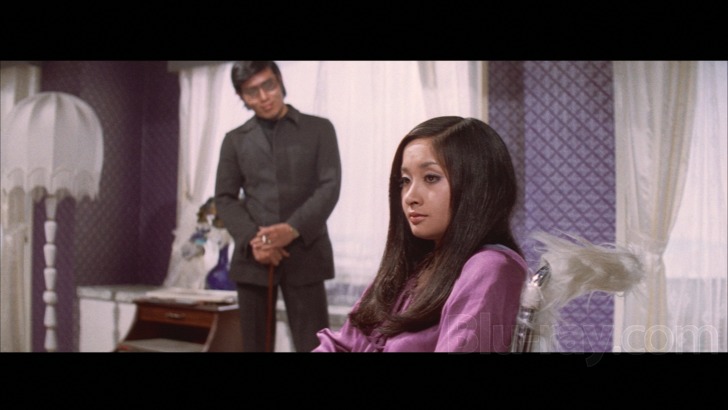
Of all the films in this set, Machine Animal may remind some fans of Roger Corman’s late sixties outings the most, as it combines both gangs and a drug element in about equal measure. This time Meiko Kaji plays a character named Maya, with her gang getting involved with both a deserter from Vietnam and an illicit drug trade. Despite the stabs at relevance, you can feel the energy lag in this film and there’s an increasing sense of entropy that afflicts both it and Beat ‘71.
Stray Cat Rock: Machine Animal Blu-ray Movie, Video Quality 
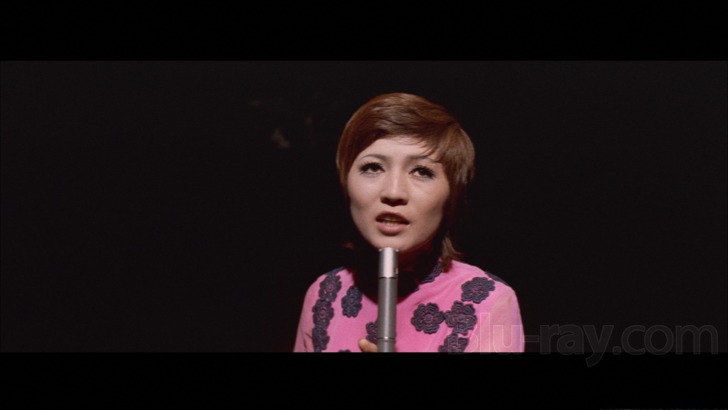
Machine Animal is presented on Blu-ray courtesy of Arrow Video with an AVC encoded 1080p transfer in 2.50:1. Since this release does not include an insert booklet, I'm not privy to any verbiage Arrow may have included about the transfer in its prior release of this title. Both Machine Animal and Beat '71 are arguably the best looking transfers in the set. The palette is nicely suffused here, and grain tends to be somewhat more tightly resolved throughout the presentation, even in less than optimal lighting conditions, though it's once again on the gritty side overall. Detail levels are generally very good, though once again a slew of "arty" framings can intentionally obscure things at times. An emphasis on some kind of evocative purple tones resonates very well. My score is 3.75.
Stray Cat Rock: Machine Animal Blu-ray Movie, Audio Quality 
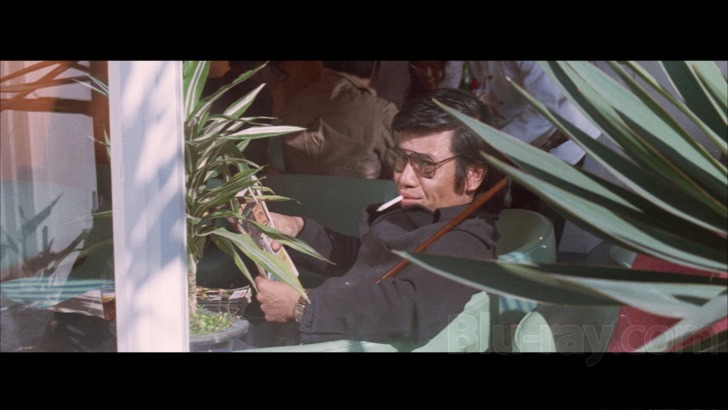
Machine Animal features an LPCM Mono track in the original Japanese. Despite its 1970 genesis and a subtext involving hallucinogenic drugs, this film doesn't exploit music to the same degree as some of the previous entries in the series, though what's here (including a song sung by Meiko Kaji) sounds fine. Dialogue and effects are rendered without any problems whatsoever. Optional English subtitles are available.
Stray Cat Rock: Machine Animal Blu-ray Movie, Special Features and Extras 
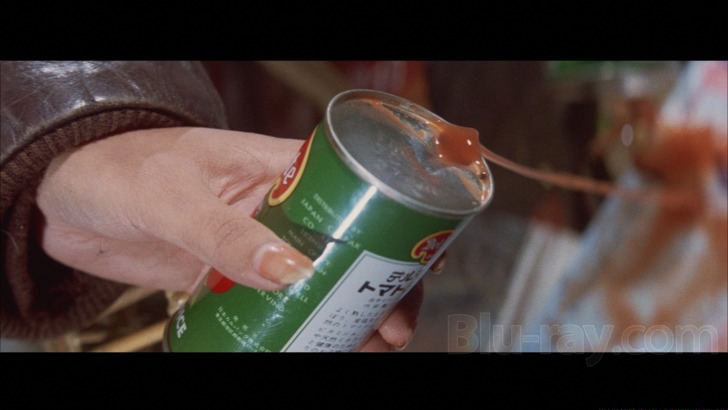
Arrow has packaged this with Delinquent Girl Boss, Wild Jumbo, and Sex Hunter on Disc One and Machine Animal
and Beat '71 on Disc Two.
Disc One
- Wild Jumbo Trailer (1080p; 2:42)
- Sex Hunter Trailer (1080p; 3:16)
- Interviews are in Japanese with English subtitles:
- Yasuharu Hasebe (1080i; 28:37)
- Tatsuya Fuji (1080i; 30:06)
- Yoshio Harada (1080i; 33:06)
- Trailers
- Machine Animal (1080p; 2:48)
- Beat '71 (1080p; 2:37)
Stray Cat Rock: Machine Animal Blu-ray Movie, Overall Score and Recommendation 

Machine Animal has some interesting elements, but you can just kind of feel the series starting to grind to a halt in this outing. Technical merits are generally solid and the supplementary package for the entire release enjoyable, for those who are considering a purchase.
Similar titles
Similar titles you might also like
(Still not reliable for this title)

Stray Cat Rock: Beat '71
1971

Stray Cat Rock: Wild Jumbo
1970

Stray Cat Rock: Delinquent Girl Boss
1970

Stray Cat Rock: Sex Hunter
Sekkusu hantâ - sei kariudo
1970

Female Prisoner Scorpion: Beast Stable
1973

Female Prisoner Scorpion: #701's Grudge Song
1973

Female Prisoner Scorpion: Jailhouse 41
1972

Female Prisoner #701: Scorpion
1972

Retaliation
縄張はもらった / Shima wa moratta
1968

Rainy Dog
1997

Shinjuku Triad Society
1995

Ley Lines
1999

Battles Without Honor and Humanity
1973

Proxy War
Battles Without Honor and Humanity
1973

Final Episode
Battles Without Honor and Humanity
1974

Police Tactics
Battles Without Honor and Humanity
1974

Voice Without a Shadow
影なき声; / Kage naki koe
1958

Careless Crime
2020

The Mob
Slipcover in Original Pressing
1975

Gina
Slipcover in Original Pressing
1975